In the fast-evolving landscape of artificial intelligence (AI), responsible technology isn’t just an ethical necessity—it’s a strategic imperative. In this article, we’ll explore the key takeaways from a recent Humans & AI in the Workplace podcast episode discussion with Anna Jaffe, Director of Regulatory Affairs and Ethics at Atlassian. Anna shares her perspective on this critical topic and here we unpack the key takeaways from Anna’s insights, including her thoughtful WOW (Wins, Opportunities, and Watch-Outs).
The Case for Responsible AI
AI has enormous potential to enhance workplace productivity, improve lives, and drive economic growth. However, as Anna emphasised, AI also introduces risks, from privacy concerns to the potential misuse of intelligent systems. Atlassian’s approach to addressing these challenges focuses on creating responsible technology—not just AI—and ensuring it aligns with human needs and values.
Anna explained that Atlassian’s principles for responsible technology—such as open communication, building trust, and ensuring accountability—are designed to bridge company values with practical application. Their “No BS” approach makes these concepts accessible to teams, even those without specialised expertise, creating a culture where responsibility becomes a shared effort.
Accessible Tools for Complex Challenges
One standout element of Atlassian’s strategy is their “No BS Guide” and responsible technology templates. These resources are freely available and intentionally designed to demystify AI ethics and governance for everyday teams. The goal is to make it easier for anyone—from individual contributors to leadership—to implement responsible AI practices.
Anna highlighted a particularly innovative feature of their template: a question asking teams to consider the “worst-case scenario” and how their technology might be misused. Framing this as a challenge to think like a “supervillain” makes the exercise approachable and encourages candid exploration of risks. This practical yet playful tone is central to Atlassian’s success in driving adoption and engagement.
Continuous Improvement: A Core Principle
Atlassian’s commitment to progress over perfection underscores their approach to responsible technology. Anna noted that the principles guiding AI and technology development must evolve alongside the technology itself. For example, as AI capabilities grow and regulations mature, the templates and principles will require regular revisiting to stay relevant. Atlassian treats these as living documents, ensuring they adapt to changing expectations and advancements.
The WOW of Humans and AI
Anna’s WOW for Humans and AI in the workplace encapsulates three key dimensions:
Wins: AI’s ability to democratise knowledge and streamline repetitive tasks is already transforming workplaces. Generative AI tools empower teams to work more efficiently, whether by summarising information or facilitating creative collaboration.
Opportunities: With AI becoming increasingly accessible, the opportunity lies in enhancing AI literacy. Anna stressed the importance of equipping teams with critical thinking skills and a deep understanding of AI’s strengths and limitations. This knowledge enables organisations to harness AI effectively while mitigating risks.
Watch-Outs: The dynamic nature of AI demands constant vigilance. From Anna’s perspective, organisations must stay ahead of emerging regulations and be proactive about addressing areas where AI impacts lives and livelihoods. She cautioned that leaders need to anticipate how AI might influence critical decisions and ensure robust safeguards are in place.
Guiding Principles for Responsible Technology
Atlassian’s principles—such as “Build for Trust” and “Accountability is a Team Sport”—serve as a guiding light for navigating AI’s complexities. These principles align internal processes with broader societal expectations, creating a cohesive framework that teams can follow. Importantly, Atlassian ensures these principles are actionable by embedding them into everyday workflows, providing clarity and consistency for decision-making.
Why Leadership Matters
Anna’s discussion also highlighted the critical role of leadership in fostering responsible AI. She called for a top-down and bottom-up approach, combining clear policies with grassroots cultural alignment. Leadership must champion transparency, accountability, and continuous improvement to create an environment where responsible AI thrives.
Final Thoughts
As organisations across the globe grapple with the implications of intelligent technologies, Atlassian’s approach offers a model worth emulating. By prioritising accessibility, continuous learning, and alignment with core values, they demonstrate that responsible AI is not only achievable but essential for long-term success. Leaders looking to implement AI responsibly should take note: it’s about building tools that reflect your organisation’s values while equipping every individual to make informed, ethical decisions.
To explore Atlassian’s principles, guide, and templates in more detail, visit their website and join the movement toward a more responsible AI future.
At AI Adaptive, we work with leaders to understand the impacts of intelligent technologies on their workforce, their culture and the leadership skills required for the future workplace.



